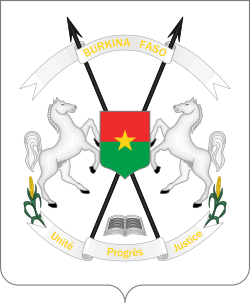2020 Burkinabé constitutional referendum
A constitutional referendum is expected to be held in Burkina Faso in 2020,[1] having originally been planned for 2019.[2] If approved, the new constitution would end the Fourth Republic created in 1991.[3]
 |
|---|
| This article is part of a series on the politics and government of Burkina Faso |
|
Parliament
|
|
Administrative divisions |
|
|
|
Background
Following the 2014 uprising, the 2015 general elections were won by the People's Movement for Progress, which contested the elections with a manifesto promising a new constitution.[4] President Roch Marc Christian Kaboré subsequently formed a Constitutional Commission in September 2016.[4] An initial draft was published in January 2017 for public consultation.[5] The Commission completed its work in November 2017 and presented the draft constitution to Kaboré.[6]
The government had planned to have the new constitution approved by the National Assembly to avoid the cost of a referendum. However, opposition parties refused to give consent to parliamentary approval, resulting in a referendum being held.[7]
Following a declaration of the Independent Electoral Commission, several media outlets announced the holding of the referendum on 24 March 2019. The date had however never been approved by the government; they denied that the date had been set the following day. Officials later reiterated the intention of the government to hold a referendum on the new constitution by 2020 at the latest. Considering the high cost of organisation and frequent terrorist attacks by jihadists, the government is considering holding this constitutional referendum at the same time as the 2020 presidential election.[2]
New constitution
The new constitution provides for a semi-presidential system, although former National Assembly Speaker Salif Diallo had called for a parliamentary system.[5] It introduces a two-term limit for the Presidency and Speaker of the National Assembly.[6] It also recognises the right to participate in civil disobedience, clean water and housing,[7] and abolishes the death penalty.[6] Burkinabé citizens living abroad will be given the right to vote in presidential and parliamentary elections from 2020 onwards.[5]
The Constitutional Council, which allowed former President Blaise Compaoré to ignore the previous constitution's term limits, will be replaced by a Constitutional Court, with the president's role in appointing members reduced to only two appointees. The High Court of Justice will also be abolished.[5]
Several sections of the new constitution are non-amendable, including the presidential term limits.[5]
References
- Assessing Africa’s 2020 Elections Africa Center for Strategic Studies
- "Burkina Faso: plusieurs options sur la table pour la date du référendum constitutionnel" [Burkina Faso: several options on the table for the constitutional referendum date]. RFI (in French). 2019-03-22. Retrieved 2018-03-26.
- Burkina Faso: Referendum on new constitution set for March 2019 APA, 28 August 2018
- Burkina Faso Profile Freedom House
- Beyond term limits: Burkina Faso's attempt to tame the presidency and to strengthen constitutional checks Constitution Net
- Burkina Faso: ce que contient l'avant-projet de Constitution remis au président RFI, 15 November 2017
- Burkina Faso: le référendum constitutionnel prévu le 24 mars 2019 RFI, 27 August 2018